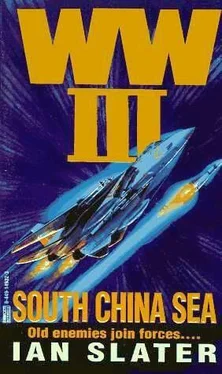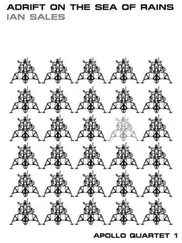“What were you going to say, General?” Marte inquired.
“You’ll have to excuse me,” he said, mumbling something about conferring with the captain.
Marte asked Martinez what the general was about to say.
“It’s kinda crude, miss.”
“C’mon,” she pressed, her notebook out, camera slung over her shoulder and her moving awkwardly in the seat belt H harness.
“No time to dip your wick,” D’Lupo put in. “No leave.”
“Oh,” she said, and smiled. Farther down the row, D’Lupo turned to Dr. Doolittle, his voice hardly audible above the roar of the engines. “I’m in love with her, Doc!”
“You and everybody else, mate,” Doolittle responded. “I’ve had a hard-on ever since we left the States.”
“Yes,” D’Lupo said.
“Well, don’t worry, old son. Sooner we clean this lot up at Thuong, sooner we’ll ‘ave time to spend wiv young Marte.”
They both knew it was bull, Martinez, like everybody else aboard except maybe Freeman, scared about going in. Only a few had seen sustained combat in Iraq — and hell, that was in the desert. In any kind of jungle, they knew, you couldn’t see an arm’s length in front of you.
“Well hell,” D’Lupo said, “we won’t be going in till the rest of the EMREF arrive.”
Doolittle didn’t know whether this was supposed to mean they’d have more time to ogle Marte Price or have more time to collectively steel their nerves. But then Doolittle and every other man aboard the Hercules was discovering once again that the company of your fellows could only go so far in comforting you — ultimately you were alone.
* * *
In the U.S. battle group, with the carrier USS Enterprise at center, steaming into the South China Sea, an echo was picked up by one of the Sea Kings’ dipping sonar and relayed to the sub Santa Fe by advanced warning aircraft. The commander of the Santa Fe prepared to dive the boat.
“Officer of the deck — last man down — hatch secured,” came the seaman’s report.
The executive officer moved to his position as officer of the deck and in turn reported to the captain, “Last man down. Hatch secured, aye. Captain, the ship is rigged for dive, current depth one two fathoms. Checks with the chart. Request permission to submerge the ship.”
“Very well, officer of the deck,” the captain responded. “Submerge the ship.”
“Submerge the ship, aye, sir. Dive — two blasts on the dive alarm. Dive, dive.”
The alarm wheezed twice sufficiently loud that every crewman aboard could hear, but not so loud as to resonate through the hull. A seaman saw to the vents and reported, “All vents shut.”
“Vents shut, aye.”
For any visitor to a sub, the obsessive litany of the dive seemed to be unnecessarily repetitive — almost comical — but there would be nothing comical about it if a single order was botched and the ship were to dive too deep too fast. Within seconds it could be below its crush depth around three thousand feet, and the next minute would be hurtling down unable to reverse its course, the quickly mounting pressure of thousands of tons per square inch driving it in excess of a hundred miles per hour to hit the bottom like a bomb imploding, its giant frame no more than flat-pressed metal scrap.
A seaman was reading off the depth. “Sixty-two… sixty-four…” and a chief of the boat reported, “Officer of the deck, conditions normal on the dive.”
“Very well, diving officer,” acknowledged the OOD, who in turn reported, “Captain, at one forty feet trim satisfactory.”
“Very well,” the captain said. “Steer five hundred feet ahead standard.”
The OOD instructed the helmsman. “Helm all ahead standard. Diving officer, make the depth for five hundred feet.”
The captain glanced over at the ethereal blue of the sonar room and its half-dozen green video screens of yellow lines, each line in the “waterfall” a sound source from the ocean, a world not of silence but a cacophony of noise, from the frying sound of schools of shrimp to the steady deep beat of a submarine’s cooling pump.
“Anything interesting, Sonar?”
“Negative.”
“Maybe it’s a diesel they heard. No pump.”
“Could be, sir.”
The captain knew he could go active, but then his own position would be betrayed. “We’ll wait.”
“Aye aye, sir.”
* * *
The Chinese frigate was now in rough water, and Mellin, alone in the fume-laden darkness, was violently ill. He had experienced seasickness twice before — once in a friend’s sailboat off the California coast near Big Sur, the other time during a ride up from the Mekong Delta aboard one of the U.S. riverine patrol boats. It was the most terrible sickness he could imagine, and he’d seen hardened combat troops humbled by the ordeal. And whereas normally the eyes became adjusted to darkness, the darkness of the paint locker was so absolute that he could not make out anything but the hard bulkhead as once more the ship’s bow rose hard astarboard, shook as if it were coming apart, then fell through a gut-emptying space, colliding with the sea.
He heard a noise and prayed it was someone coming to let him out.
High up in the Hong Kong tower that he owned by special agreement with the People’s Administrative Committee of Hong Kong, Jonas Breem of Caloil surveyed Victoria harbor and the clustering of high-rise apartments and business offices, and imagined what it might be like ten years hence. Breem, gesturing with his large scotch and ice to his concubine, Mi Yin, said, “Beijing will make a mint.”
“Maybe not,” proffered Mi Yin, a diminutive five feet, the sheen of her black hair catching a reflection from Breem’s opulent bar.
Breem didn’t turn his head, but kept looking out the enormous tinted plate-glass window, swirling the ice in his drink. “And what the shit would you know about it?” he said. “You’re paid to fuck, not forecast.”
She shrugged, apparently not bothered by his vulgar outburst. “I was just thinking,” she said matter-of-factly.
“Well don’t,” he cautioned. “Get your ass over here.”
She got up from the couch, the midnight blue qi pao she was wearing amply split at the thigh, revealing a brown slash of flesh that Breem always found enticing. His drink in his right hand, he steered her in front of him with his left, unzipped the qi pao and slid his hand around, following the line of her bra, cupping her breasts, squeezing them tightly.
“You like that?” he asked.
“Yes,” she lied, and wondered how it was that such a man had risen to the top of the heap in his cutthroat business yet was so stupid about women as to think a woman liked having her breasts squeezed tightly. Maybe he knew very well they didn’t like it, but he kept doing it anyhow, control of any situation being his nirvana.
Breem called her just one of his Hong Kong “fringe benefits,” though he knew she was highly intelligent as well as beautiful, her sense of irony as subtle as her perfume, her timing deft as a lover of long experience. He was also sure Mi Yin was an operative of the Gong An Bu, the Chinese secret police — sent to keep tabs on him — her “accidental” meeting with him no doubt carefully arranged by Beijing. Well, he’d screw her on behalf of the people, he resolved, and she wouldn’t get any more out of him than he wanted to give. He was convinced that after she’d taken off the sexy, thigh-split qi pao and made love, and he lay back snoring, she’d be quickly checking his briefcase for the seismic and drill reports he received daily by fax from the various drill sites scattered throughout the countries of Southeast Asia. In one of those quirky war situations not known to the general public, the Chinese had taken over all the drill sites, moving all the American experts to a concentration camp, yet the daily drill reports from the skeleton-staffed Chinese drill site crews were still faxed to Breem in Hong Kong as the head of Chical Enterprises and Caloil.
Читать дальше












